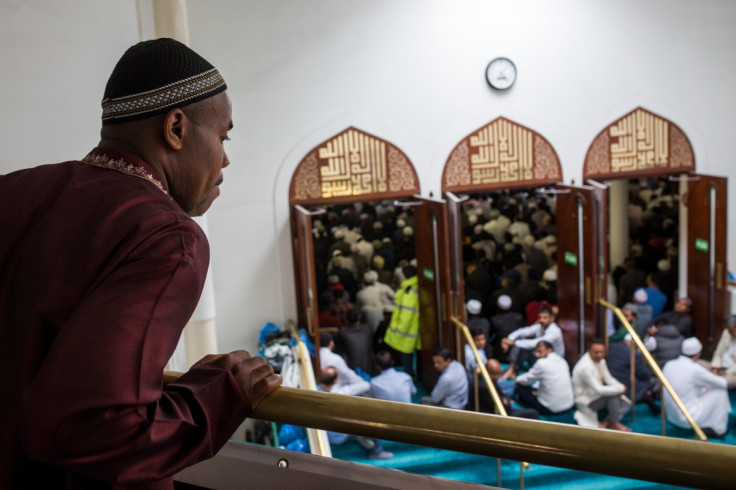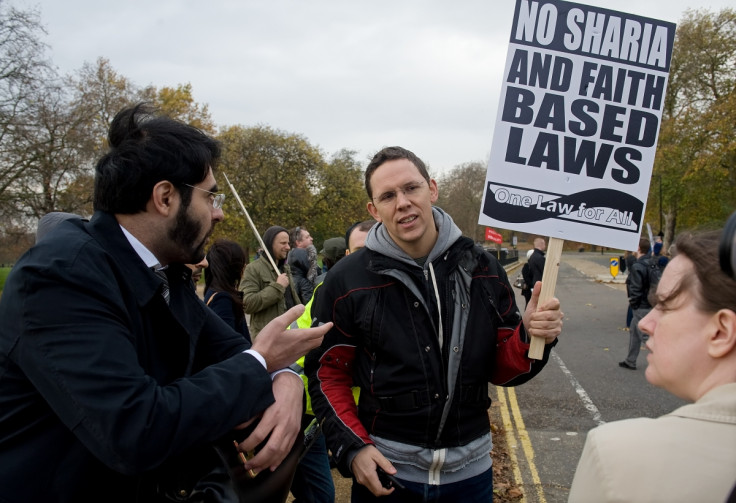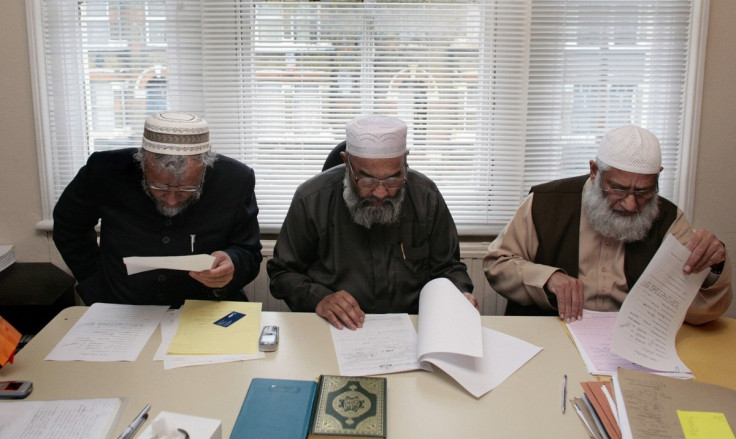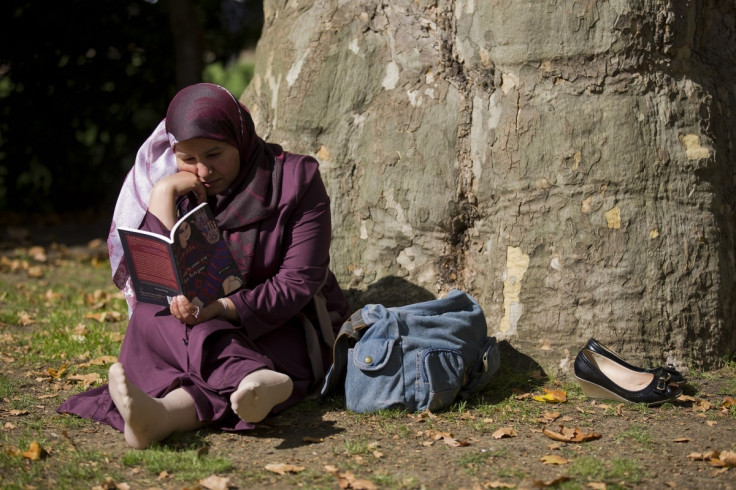Is Sharia law good for the UK? Islamic code helps Muslims and non-Muslims live in peace, believes top scholar

Sheikh Suhaib Hasan was recently visited by a non-Muslim, a blind man who had frequently found himself turned away by Muslim taxi drivers who considered his guide dog unclean and would not permit it in their cars. Frustrated, the man asked the 73-year-old scholar for advice.
"I had to think about it," said Hasan, sat in his small office at the Islamic Sharia Council (ISC) in Leyton, which he founded in 1982. "As a taxi driver, he is not permitted to decline someone from driving with him [but] then a person who has to pray five times a day has to avoid this kind of contact with a dog.
So what is a 'fatwa'?
A 'fatwa' is a ruling on a point of Islamic law made by an authority on Islamic history or law, or a qualified jurist.
'Fatwa' is only used to describe an innovative or ground-breaking decisions, otherwise these legal proclamations are just referred to as 'rulings'.
A person who issues a fatwa is called a 'mufti', which comes from the Arabic verb aftā, meaning "he gave a formal legal opinion on".
"But the hairs on the skin of the dog is not dirty… it is medically proven that all the germs are in the saliva, so as long as he doesn't come in contact with the saliva, it is alright. So he can have a small mat or piece of cloth and spread it on the seat. That is the fatwa I have given – it is a practical situation."
When many non-Muslims think of fatwas, orders to kill authors, bans on chess, Mickey Mouse or sex with the dead might come to mind, but the reality is much more mundane. Sheikh Hasan, an India-born scholar who has spent 40 years living in Britain, spends the bulk of his time dealing with the practicalities of applying laws written in sixth century Arabia, which cover everything from Ramadan fasting times to mortgages, to life in present-day England.
As head of the fatwa department at the ISC, he charges £50 per hour to look into the details of Islamic law and issue a written judgement when posed a question. Just hours before IBTimes UK visited him at his office, he had prepared one for a young couple after the husband divorced his wife during an argument. In a ṭalāq divorce, Muslim marriages can be dissolved verbally by men. (Muslim women do not have this option, and must petition a judge for their marriage to be dissolved.) This means the Sheikh is often sought out by husbands who regret their decision to end their marriage, once the dust has settled.

"Many people in the moment of anger say 'I divorce you' and later they regret, so there is room for them to go back. This couple has come to me and… now he regrets it and wants to take it back. All the other scholars [said] it is final, you can't take it back. So they are stuck," he said.
Contrary to popular opinion, Sheikh Hasan said, a verbal divorce is not final. Under Islamic law, if it is proclaimed by a man in a fit of anger, it can be overturned. But in this cases, he added a disclaimer: he told the young man to make a pledge below his fatwa – signed by all parties – that he would not divorce his wife again in this way, and that if he wanted to end the marriage they would have to come before the court and do it properly.
"I know that this guy keeps doing the same thing, so I know that I need have mercy upon this poor lady. I must deter him not to do it. I want to make it serious thing," he said.
The problem with fatwas – arguing lawyers
The fact that the young couple in question had been given such contradictory advice by other scholars demonstrates the underlying problem with fatwas: any imam (a person in a leadership role in the Muslim world, usually someone who leads prayers in a mosque) can issue a verbal fatwa. Written fatwas, on the other hand, can only be given by a scholar of at least eight years training and who has an Islamic education. The better the education and background of the scholar, the more respected the fatwa.
"A fatwa is an opinion – there may be many other people who differ from it," said Hasan, adding that even the most famous and established Islamic scholars have disagreed on matters of Islamic law.
Muslims must not do anything wrong to the host countries that are giving them safe haven. They should live as peaceful citizens
- Sheikh Hasan
A graduate of the University of Medina in Saudi Arabia, Sheikh Hasan studied under former Saudi Grand Mufti, Abdul-Aziz Ibn Baz, Muhammad al-Albani and his own father Sheikh Abdul Ghaffar Hasan. His daughter, Khola Hasan, is a scholar at ISC and is one of the few female Sharia judges in Britain, while his son, Usama, is a controversial figure due to his modernist views on Islam and association with the Quilliam Foundation.
As well as consulting the Quran and the Hadith – sayings and statements attributed to the Prophet Mohammed – scholars also look back at the fatwas published by their contemporaries and predecessors through the ages. So among the books that line Sheikh Hasan's wall in his office includes a book of fatwas from 15th century Andalucía, as well as books of his own fatwas and those of dozens of other mufti. But many of the questions Sheikh Hasan fields are dilemmas caused by modern life.

One recent case related to mortgages, when a man came to him for a fatwa that would allow him to buy a house. Islamic law forbids Muslims from paying interest on loans, meaning that many believers either rent their homes or have to take out Sharia-compliant loans from Islamic or Western banks. As Islamic banks require sizable deposits, only a handful of the Western banks offer these services, and London rents are rising exponentially, this makes renting and buying are difficult for ordinary Muslims.
"Many scholars are strict on that: they say if it is interest based, then it is not allowed. [But] even something prohibited is allowed for a Muslim, if he is in such a situation that he has to save his life… There are a few necessities of life [and] among them is to have a house. Without a house you cannot survive in this extreme weather, the cold and snow and so on," he said.
When you speak about Sharia all they think about is chopping off hands and flogging the fornicators – they don't think about all the good things about Sharia itself
- Sheik Hasan
Sharia courts – the ISC among them – have been widely criticised for being sexist and discriminatory to Muslim women, particularly given that most court judges are men of Sheikh Hasan's age. This criticism recently persuaded Baroness Cox to bring a bill to the House of Lords, which passed this month, that would heavily restrict their scope in Britain. But Sheikh Hasan argues that without sharia councils the position of women would be worse.
"I sometimes think: 'Let us close the council' and then I see how many women get relief from [what we do]. We are working for them. [The media] might talk about the few unsatisfied women or men and criticise us, but if they interviewed all the other women who got relief, they would have to change their opinion," he said.

"There are a few words that have become a source of irritation – long ago it was 'jihad', now it is 'Sharia'. When you speak about Sharia all they think about is chopping off hands and flogging the fornicators – they don't think about all the good things about Sharia itself."
The work of the courts can be difficult, Sheikh Hasan recalls, particularly when angry husbands take issue with his judgements. He has had hot tea thrown at him and a few years ago a man living in Bangladesh sent him white powder in an envelope that gave him a rash, after the Sheik ruled against him. The ISC has since installed CCTV cameras, so that footage can be passed on to the police.
Horror at extremism
As someone who has lived in the UK for some four decades, Sheikh Hasan has been shocked by the rise of extremism in the Muslim community, but sees much of its root in the British government's foreign policy. British Muslims have felt increasingly alienated since the UK embarked on a series of disastrous interventions in the Middle East, from the invasions of Iraq and Afghanistan, to the ongoing silence over Israel's treatment of Palestine.
Yet Hasan says that when he preaches it is to tell Muslims in the UK that they have been given a safe haven in Britain, particularly those that have escaped brutal conditions in Bosnia, Somalia, Iraq or Afghanistan: "Why don't they consider that these countries are giving them safety that they do not find in their own countries? So they must not do anything wrong to the host countries. They should live as peaceful citizens," he said. The roots of this are in Sharia law, which has determined that Muslims are obligated to obey the laws of whichever country they are living in.

But the fact remains that many of those being radicalised are young Muslims, preyed on by online militants half or even a third of Sheikh Hasan's age. He admits that in many ways technology has helped Islamic law – he says he receives some 300 emails a day from Sharia scholars from across the world – but equally, it will be up to a younger generation of Islamic scholars to ensure that young British Muslims follow the right path.
"I find myself handicapped. It is difficult for a person of my generation to talk to young people and to satisfy what they are asking and satisfy their questions, and for this I think that more younger people of my own sons and daughters generation that is more capable of dealing with [them]," he said. "I find it very difficult, but anyhow, as a Muslim I am supposed to do my duty within my ability and I am still doing it."
© Copyright IBTimes 2025. All rights reserved.






















